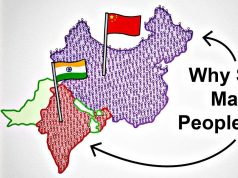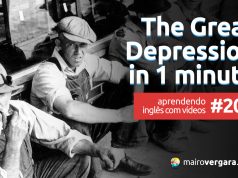Aprendendo inglês com vídeos é uma série de posts em que traremos para vocês vídeos acompanhados de transcrições e traduções, pois este é um material de altíssima qualidade para qualquer estudante de inglês. A grande maioria dos vídeos virão do YouTube, assim como forma de retribuir aos criadores dos vídeos incríveis que vamos usar, pedimos que você sempre dê o seu “Gostei” no vídeo (ao clicar para reproduzir o vídeo você verá a opção “gostei” no próprio vídeo).
Ron Garan: To the Moon or to Mars? (Transcrição)
Ron Garan: Should we go to the Moon or should we go to Mars? We should go to both. But I guess the real question is, ‘where do we go next? What’s the next step?’ And I think this goes back to The Orbital Perspective as well. I think The Orbital Perspective, you know, the part of The Orbital Perspective that talks about long-term planning. You know, let’s look 20, 30, 40, 50 years down the road and see what affects our decisions that we make today will take us, you know, what trajectory will that put us on? Where will that get us in that timeframe? And so, if we go to Mars first, which we can do, I’d say it would probably be 10 to 15 years from the time we make a decision to go to Mars, we could probably get to Mars. But by making a decision, that means we’ve allocated the necessary funding, et cetera, et cetera. But another path to Mars would be to go to the Moon first. And by going to the Moon first – and what I mean by that is by establishing a transportation infrastructure between the Earth and the Moon and a permanent human presence on the Moon. So we have routine travel between Earth and its nearest neighbor. By doing that, that would open up the entire solar system. That enables us to use the resources that are on the Moon, it enables us to launch in a much lower gravity field than Earth. It opens up tremendous benefits to the entire population of the Earth, by making use of our nearest neighbor. There’s energy on the Moon. There’s scientific discoveries on the Moon. The list goes on and on, all the benefits to Earth that the Moon provides. And so not only would we get those benefits, not only would we be able to have this traffic infrastructure for routine travel to the Earth and the Moon, but we’d open up the rest of the solar system including Mars. So to me, from a long-term point of view, it makes sense to have the next step being to return to the Moon, this time to stay.
Ron Garan: Para a Lua ou para Marte? (Tradução)
Ron Garan: Nós deveríamos ir para a Lua ou nós deveríamos ir para Marte? Nós deveríamos ir para os dois. Eu acho que a verdadeira pergunta é: “para onde nós vamos primeiro? Qual o próximo passo?” E eu acho que isso volta ao (livro) The Orbital Perspective também. Eu acho que The Orbital Perspective, sabe, a parte The Orbital Perspective que fala sobre planejamento de longo prazo. Sabe, vamos olhar 20, 30, 40, 50 anos no futuro e ver o que afeta nossas decisões, que fazemos hoje vai tomar de nós, em que trajetória isso vai nos colocar? Onde isso vai nos levar nesse espaço de tempo? E então, se nós formos para Marte primeiro, o que nós podemos fazer, eu diria que isso seria provavelmente entre 10 a 15 anos a partir de quando nós tomarmos a decisão de ir para Marte, é que nós chegaríamos em Marte. Mas ao tomar uma decisão, isso significa que alocamos os fundos necessários, etc, etc. Mas um outro caminho para Marte seria ir para a Lua primeiro, e indo para a Lua primeiro – e o que eu quero dizer com isso é estabelecer uma infraestrutura de transporte entre a Terra e a Lua e uma presença humana permanente na Lua. Assim, teremos uma rotina de viagem entre a Terra e o seu vizinho mais próximo. Fazendo isso, isso abriria o sistema solar inteiro. Isso nos permite usar os recursos que estão na Lua, isso nos permite fazer um lançamento em um campo de gravidade muito mais baixo que na Terra. Isso traz tremendos benefícios para toda a população da Terra, fazendo uso do nosso vizinho mais próximo. Há energia na Lua. Há descobertas científicas na Lua. A lista continua, todos os benefícios para a Terra que a Lua proporciona. E assim, nós não somente conseguiríamos esses benefícios, não somente seríamos capazes de ter essa infraestruturas de tráfego para um rotina de viagem entre Terra e Lua, mas nós abriríamos o resto do sistema solar, incluindo Marte. Então, para mim, em uma visão de longo prazo, faz sentido ter como próximo passo, ser retornar para a Lua, dessa vez para ficar.
Espero que vocês tenham gostado do vídeo de hoje e da transcrição/tradução! Como sempre, não deixem de visitar o vídeo no Youtube e dar o seu “gostei”, pois assim vocês estão ajudando o trabalho dos criadores desses vídeos incríveis! Link para o vídeo no YouTube: https://www.youtube.com/watch?v=IyPr0VCiqsI
Abração e bons estudos a todos vocês!










